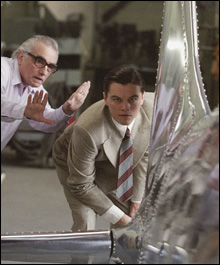 Who are the world’s greatest living narrative filmmakers, what I call the Magnificent Seven? Several Film Cultures ago, I offered my elite — Ingmar Bergman, Michelangelo Antonioni, Jean-Luc Godard, Robert Altman, Werner Herzog, Roman Polanski, Claude Chabrol — and challenged readers to come up with alternatives. Well, e-mails poured in from as far as C.W. Post College on Long Island and as wide as Stoughton. I did attract a mix of amateur cinema fans and media professionals: curators, filmmakers, professors. Some 60 more filmmakers were nominated.
Who are the world’s greatest living narrative filmmakers, what I call the Magnificent Seven? Several Film Cultures ago, I offered my elite — Ingmar Bergman, Michelangelo Antonioni, Jean-Luc Godard, Robert Altman, Werner Herzog, Roman Polanski, Claude Chabrol — and challenged readers to come up with alternatives. Well, e-mails poured in from as far as C.W. Post College on Long Island and as wide as Stoughton. I did attract a mix of amateur cinema fans and media professionals: curators, filmmakers, professors. Some 60 more filmmakers were nominated.
The biggest surprise? Not a single vote for Steven Spielberg, Spike Lee, or Ang Lee. Nada for Pedro Almodóvar or any Spanish-language filmmaker. Or any African, Italian, or Russian one. Jane Campion was the only woman filmmaker to get more than one vote. The other female directors who made ballots: Chantal Akerman, Elaine May, Claire Denis.
What, according to readers, were my biggest errors? Actually, no one complained about who I put on, only who I excluded. Six emails pointed me to Martin Scorsese. “Listing Scorsese comes off as a bit of a cliché, especially for a first-year film student,” wrote Christopher Godburn, 19, “but the fact of the matter is he makes great films.” Four votes went to Woody Allen, and, the most for non-American directors, three each to Mike Leigh and Wong Kar-wai. Of the latter, Harvard film-conservationist Julie Buck wrote, “His visuals are to be swooned over. His candy colors, the performances he pulls out of actors — Wong Kar-wai is simply brilliant.”
Other winners:
Stanley Donen. “The musical may be dead or at least moribund, but the man who had a hand in Singin’ in the Rain, On the Town, and Seven Brides for Seven Brothers should get consideration,” says Randy Steinberg, film teacher.
Clint Eastwood. “What makes a great director? To paraphrase Howard Hawks: two or three great movies, and no bad movies. Clint definitely qualifies here,” claims Richard Partridge, film fan
Mark Rappaport. “The best-kept secret in American cinema: The ScenicRoute, Local Color, Chain Letters, etc. represent the greatest sustained cinematic achievement of the 1970s and 1980s.” So speaks Ray Carney, BU cinema professor and author.
Hou Hsiao-Hsien. “With a single image, he can give you the difference between city and country, past and present, while keeping a subtle character and story development in motion.” That’s the opinion of Mike Bowes, president of the Brattle Theatre’s board of directors.
Patrice Leconte. “In the category of making fabulously enjoyable films, my vote goes to the versatile Leconte. No other director — living or dead — do I so consistently admire and love,” chimes in Bruce Kingsley, Web film critic.
Gus Van Sant. “For the balls to experiment with an inspirational series of near-silent, minimalist films — Gerry, Elephant, and LastDays.” That’s how filmmaker Garth Donovan sees it.
Atom Egoyan. “My favorite director! His films are cerebral explorations of identity, voyeurism, which become ever more layered and accomplished.” This vote comes from Michael Colford, president of the Chlotrudis Awards.